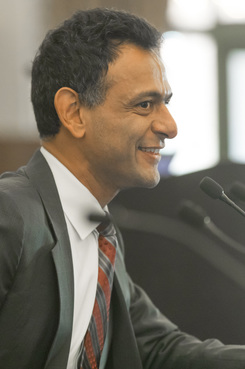At Gibson Dunn, This Facebook Lawyer Inked FTC Privacy Deal Now in Spotlight
While at Gibson Dunn, Facebook in-house attorney S. Ashlie Beringer signed off on the company's 2011 FTC settlement which is back in the spotlight because of the company's latest data snafu.
March 20, 2018 at 02:58 PM
7 minute read
The original version of this story was published on National Law Journal
 Gibson Dunn offices in Washington. Credit: Diego M. Radzinschi/ ALM
Gibson Dunn offices in Washington. Credit: Diego M. Radzinschi/ ALM
Amid broader concerns about how Russia exploited social media to interfere in the 2016 election, Facebook Inc. faces growing scrutiny over the transfer of up to 50 million users' personal data to a voter-profiling firm linked to President Donald Trump's campaign.
Lawmakers have called for Facebook CEO Mark Zuckerberg to be summoned for hearings in Washington. Another Facebook executive, Chief Information Officer Alex Stamos, plans to leave the company later this year—reportedly after meeting resistance when he advocated for more transparency about Russia's use of the social media platform.
Now, the Federal Trade Commission is reportedly investigating whether Facebook violated the terms of a 2011 settlement over its handling of user data. That settlement required Facebook to, among other things, obtain express consent before sharing user information beyond what individual privacy settings allow.
Inside Facebook, one lawyer is especially familiar with the terms of that 7-year-old settlement.
 Ashlie Beringer
Ashlie BeringerIn 2011, S. Ashlie Beringer was one of the two Gibson, Dunn & Crutcher partners—along with M. Sean Royall—who signed the FTC settlement with Facebook's general counsel at the time, Theodore Ullyot.
Two years after guiding Facebook to that agreement, in 2013, Beringer left Gibson Dunn to become vice president and deputy general counsel at Facebook, where she leads the global regulatory, product and privacy legal team.
Also on the settlement was the director of the FTC's consumer protection bureau at the time, David Vladeck, who said Beringer's involvement in the 2011 settlement “makes her uniquely well-prepared to represent Facebook's position in this matter.”
“She's the principal signer of the consent decree. She was actively involved in negotiating the decree. My impression of her is she's one hell of a good lawyer,” Vladeck said in an interview Tuesday.
Beringer, formerly a Gibson Dunn partner in Palo Alto, California, did not immediately respond to a request for comment Tuesday. Facebook also did not immediately comment.
“We reject any suggestion of violation of the consent decree. We respected the privacy settings that people had in place,” Facebook told The Washington Post in a March 18 report. “Privacy and data protections are fundamental to every decision we make.”
The New York Times and The Guardian reported over the weekend that a voter-profiling company, Cambridge Analytica, mined the personal information of more than 50 million Facebook users without their permission—data that was then wielded for targeting political advertising. Cambridge Analytica obtained the data from Aleksandr Kogan, a researcher who developed an app he claimed would only be scraping users' information for academic purposes.
In recent days, Vladeck has said Cambridge Analytica's harvesting of that data raises questions about whether Facebook has complied with the terms of the 2011 consent decree.
“The real problem for Facebook is there are multiple provisions of the consent decree that— at least from what I know now—there's real reason to believe were violated by Facebook,” Vladeck said. “This is a violation of a consent, so civil penalties are available to the commission if a violation occurred. So this will be a very serious investigation by the FTC.”
Vladeck said Facebook's team of lawyers in 2011 included not only Ullyot and Beringer but Gibson Dunn partner Eugene Scalia and the company's deputy general counsel at the time, Colin Stretch, who took an active role in the FTC negotiations and traveled to Washington to meet with agency officials.
Stretch, now the Facebook general counsel, has served as the face of Facebook as the company, along with Google and Twitter, have been questioned about Russian-purchased election advertisements.
 Paul Grewal. Credit: Jason Doiy/ ALM
Paul Grewal. Credit: Jason Doiy/ ALMPaul Grewal, vice president and deputy general counsel at Facebook, has been the company's name on statements responding to the scrutiny over the data acquisition by Cambridge Analytica. Grewal is a former federal magistrate judge in California who joined Facebook in 2016.
“The claim that this is a data breach is completely false. Aleksandr Kogan requested and gained access to information from users who chose to sign up to his app, and everyone involved gave their consent,” Grewal said in a statement March 17. “People knowingly provided their information, no systems were infiltrated, and no passwords or sensitive pieces of information were stolen or hacked.”
The FTC's renewed investigation into Facebook could bring about a reunion of sorts.
Six years after signing the Facebook settlement, Maneesha Mithal continues to serve as the associate director overseeing the privacy and identity protection division within the FTC's consumer protection bureau. And another FTC attorney, Laura Berger, still works in the agency's privacy and identity protection division.
Christopher Olsen, who served as the division's assistant director at the time of the settlement, has since become a partner at Wilson Sonsini Goodrich & Rosati, where he focuses on privacy, cybersecurity, and data security issues. Another FTC attorney on the 2011 settlement, Manas Mohapatra, left the agency in 2013 to become an associate general counsel at Twitter. He left in November to become the chief global privacy counsel at Viacom.
An FTC spokeswoman said Tuesday: “We are aware of the issues that have been raised but cannot comment on whether we are investigating. We take any allegations of violations of our consent decrees very seriously as we did in 2012 in a privacy case involving Google.”
In that case, Google paid a $22.5 million penalty to resolve claims that it misrepresented to users of Apple's Safari browser that it would not place tracking “cookies” or serve targeted ads to them, in violation of a settlement reached in October 2011.
“The record setting penalty in this matter sends a clear message to all companies under an FTC privacy order,” then-FTC chairman Jon Leibowitz, now a partner at Davis, Polk & Wardwell, said in a statement. “No matter how big or small, all companies must abide by FTC orders against them and keep their privacy promises to consumers, or they will end up paying many times what it would have cost to comply in the first place.”
Read more:
Facebook's Hiring a Compliance Lawyer to Focus on Political Activity
Google, Facebook, and Twitter Spend Millions Lobbying as Russia Scrutiny Builds
Apple Lawyer Warns of 'Heavy' Burden From Europe's New Privacy Rules
This content has been archived. It is available through our partners, LexisNexis® and Bloomberg Law.
To view this content, please continue to their sites.
Not a Lexis Subscriber?
Subscribe Now
Not a Bloomberg Law Subscriber?
Subscribe Now
NOT FOR REPRINT
© 2025 ALM Global, LLC, All Rights Reserved. Request academic re-use from www.copyright.com. All other uses, submit a request to [email protected]. For more information visit Asset & Logo Licensing.
You Might Like
View All
Meta agrees to pay $25 million to settle lawsuit from Trump after Jan. 6 suspension
4 minute read
How We Won It: Latham Secures Back-to-Back ITC Patent Wins for California Companies
6 minute read
Trending Stories
- 1Delaware Supreme Court Names Civil Litigator to Serve as New Chief Disciplinary Counsel
- 2Inside Track: Why Relentless Self-Promoters Need Not Apply for GC Posts
- 3Fresh lawsuit hits Oregon city at the heart of Supreme Court ruling on homeless encampments
- 4Ex-Kline & Specter Associate Drops Lawsuit Against the Firm
- 5Am Law 100 Lateral Partner Hiring Rose in 2024: Report
Who Got The Work
J. Brugh Lower of Gibbons has entered an appearance for industrial equipment supplier Devco Corporation in a pending trademark infringement lawsuit. The suit, accusing the defendant of selling knock-off Graco products, was filed Dec. 18 in New Jersey District Court by Rivkin Radler on behalf of Graco Inc. and Graco Minnesota. The case, assigned to U.S. District Judge Zahid N. Quraishi, is 3:24-cv-11294, Graco Inc. et al v. Devco Corporation.
Who Got The Work
Rebecca Maller-Stein and Kent A. Yalowitz of Arnold & Porter Kaye Scholer have entered their appearances for Hanaco Venture Capital and its executives, Lior Prosor and David Frankel, in a pending securities lawsuit. The action, filed on Dec. 24 in New York Southern District Court by Zell, Aron & Co. on behalf of Goldeneye Advisors, accuses the defendants of negligently and fraudulently managing the plaintiff's $1 million investment. The case, assigned to U.S. District Judge Vernon S. Broderick, is 1:24-cv-09918, Goldeneye Advisors, LLC v. Hanaco Venture Capital, Ltd. et al.
Who Got The Work
Attorneys from A&O Shearman has stepped in as defense counsel for Toronto-Dominion Bank and other defendants in a pending securities class action. The suit, filed Dec. 11 in New York Southern District Court by Bleichmar Fonti & Auld, accuses the defendants of concealing the bank's 'pervasive' deficiencies in regards to its compliance with the Bank Secrecy Act and the quality of its anti-money laundering controls. The case, assigned to U.S. District Judge Arun Subramanian, is 1:24-cv-09445, Gonzalez v. The Toronto-Dominion Bank et al.
Who Got The Work
Crown Castle International, a Pennsylvania company providing shared communications infrastructure, has turned to Luke D. Wolf of Gordon Rees Scully Mansukhani to fend off a pending breach-of-contract lawsuit. The court action, filed Nov. 25 in Michigan Eastern District Court by Hooper Hathaway PC on behalf of The Town Residences LLC, accuses Crown Castle of failing to transfer approximately $30,000 in utility payments from T-Mobile in breach of a roof-top lease and assignment agreement. The case, assigned to U.S. District Judge Susan K. Declercq, is 2:24-cv-13131, The Town Residences LLC v. T-Mobile US, Inc. et al.
Who Got The Work
Wilfred P. Coronato and Daniel M. Schwartz of McCarter & English have stepped in as defense counsel to Electrolux Home Products Inc. in a pending product liability lawsuit. The court action, filed Nov. 26 in New York Eastern District Court by Poulos Lopiccolo PC and Nagel Rice LLP on behalf of David Stern, alleges that the defendant's refrigerators’ drawers and shelving repeatedly break and fall apart within months after purchase. The case, assigned to U.S. District Judge Joan M. Azrack, is 2:24-cv-08204, Stern v. Electrolux Home Products, Inc.
Featured Firms
Law Offices of Gary Martin Hays & Associates, P.C.
(470) 294-1674
Law Offices of Mark E. Salomone
(857) 444-6468
Smith & Hassler
(713) 739-1250







